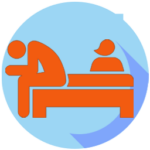Imagine a life where your daytime is a constant struggle against an overwhelming desire to sleep, where the boundary between reality and dreams blurs unexpectedly. This is the world of narcolepsy, a neurological disorder that transforms the natural rhythm of wakefulness and sleep into a perplexing puzzle. In this blog, we will delve into the fascinating intricacies of narcolepsy, exploring its causes, symptoms, diagnosis, and potential treatment options.
Understanding Narcolepsy: A Sleep Disorder Like No Other
Narcolepsy is a chronic neurological disorder that affects the brain’s ability to regulate sleep-wake cycles. It disrupts the balance between being awake and being asleep, resulting in sudden episodes of sleepiness during the day. People with narcolepsy often experience cataplexy, a sudden loss of muscle tone triggered by strong emotions like laughter or surprise, leading to partial or complete muscle weakness. This can range from a slight droop in facial muscles to complete physical collapse.
The Science Behind Narcolepsy
Narcolepsy is closely linked to the brain’s control over the sleep-wake cycle and the neurotransmitter hypocretin (also known as orexin). Hypocretin plays a crucial role in promoting wakefulness and regulating rapid eye movement (REM) sleep, during which most dreaming occurs. In individuals with narcolepsy, there is a deficiency of hypocretin due to the destruction of cells that produce it. This deficiency leads to the erratic transitions between wakefulness and REM sleep, contributing to the characteristic symptoms of narcolepsy.
Unraveling the Symptoms
The symptoms of narcolepsy can significantly impact daily life. Apart from excessive daytime sleepiness and cataplexy, individuals may experience sleep paralysis, a temporary inability to move while falling asleep or waking up. Vivid and intense dreams that occur right before falling asleep or waking up, known as hypnagogic and hypnopompic hallucinations respectively, are also common in narcolepsy.
Diagnosis and Treatment
Diagnosing narcolepsy involves a combination of clinical evaluations, sleep studies, and specialized tests such as polysomnography and multiple sleep latency tests. Once diagnosed, managing narcolepsy becomes a collaborative effort between the individual, their healthcare provider, and a comprehensive treatment plan.
Treatment options may include:
- Lifestyle Modifications: Maintaining a regular sleep schedule, practicing good sleep hygiene, and taking short naps during the day can help manage symptoms.
- Medications: Stimulants such as modafinil or armodafinil are often prescribed to combat excessive daytime sleepiness. Antidepressants and sodium oxybate can be used to manage cataplexy and other REM-related symptoms.
- Therapies: Behavioral therapies can assist in managing symptoms and improving overall quality of life. Cognitive-behavioral therapy for insomnia (CBT-I) can help regulate sleep patterns.
Living with Narcolepsy: Challenges and Triumphs
Living with narcolepsy can be challenging, but many individuals find ways to thrive. Support groups, both online and offline, offer a platform to share experiences, tips, and emotional support. Educating friends, family, and coworkers about the condition can create a supportive environment.
The Road Ahead: Advances in Research
As the scientific community continues to unravel the mysteries of narcolepsy, ongoing research aims to uncover more effective treatments and potential interventions. Investigating the genetic and environmental factors that contribute to narcolepsy’s development could pave the way for personalized therapies.
Conclusion
Narcolepsy is a captivating window into the intricate workings of the human brain and the delicate balance it maintains between wakefulness and sleep. By shedding light on the science behind narcolepsy and the experiences of those who live with it, we can build empathy and awareness for this often-misunderstood disorder. As research progresses, hope grows for improved treatments and enhanced quality of life for individuals with narcolepsy.
If you suffer from Narcolepsy, we advise taking Generic Modvigil












